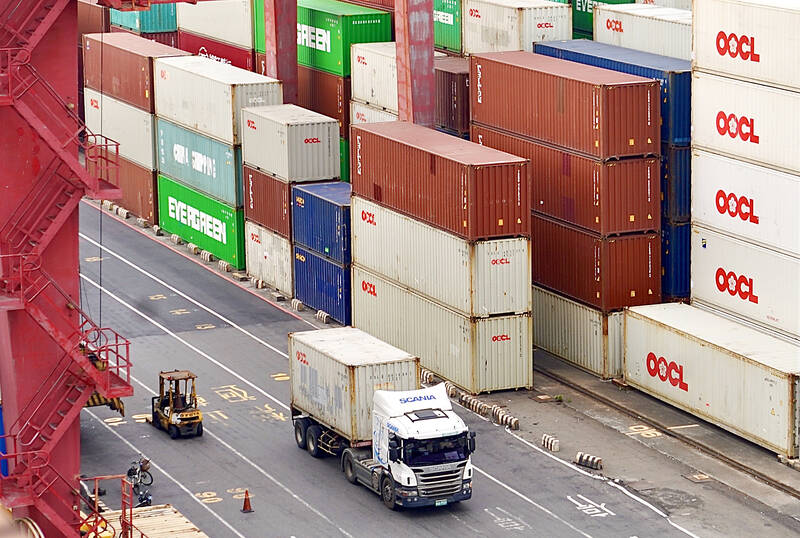Taiwan’s exports last month soared 29.9 percent year-on-year to US$48.66 billion, the second-highest on record, thanks to front-loading demand for tech products used in artificial intelligence (AI) and high-performance computing, after Washington announced a 90-day respite for its “reciprocal” tariffs, the Ministry of Finance said yesterday.
Last month’s export momentum proved stronger than expected and is to continue this month, with an annual increase of 15 percent to 20 percent, Department of Statistics Director-General Beatrice Tsai (蔡美娜) said.
“Front-loading demand and rush orders are evident across sectors,” Tsai said. “The 90-day pause prompted firms on the sidelines to actively build inventory.”

Photo: CNA
That could disrupt seasonality for technology products — with the first half of this year outperforming the second half in terms of sales, Tsai said.
Outbound shipments of information and communications technology products spiked 60.5 percent annually to US$18.83 billion last month, overtaking electronic components as the top driver, on the back of demand from AI infrastructure and big data centers, she said.
Shipments of electronic components, mainly chips, increased 26.8 percent to US$16.41 billion, consistent with Taiwan Semiconductor Manufacturing Co’s (台積電) expectations.
The company has said that it does not see customers canceling orders amid uncertainty related to US tariffs.
Front-loading also benefited exports of chemicals, base metals, optical products and machinery equipment, the ministry said, adding that last month, all major markets’ shipments — except Europe — recorded double-digit percentage growth.
Mexico saw a threefold increase, while Malaysia rapidly climbed to the fourth-largest export destination, after China, the US and Japan, Tsai said, adding that it was due to the ongoing global supply chain realignment.
Imports last month also expanded 33 percent year-on-year to US$41.16 billion, fueled by local tech firms’ purchases of capital equipment and the deepening of global division of labor in the tech supply chain, Tsai said.
That gave Taiwan a trade surplus of US$7.21 billion in the month, up 15 percent from a year earlier.
Tsai declined to comment on the effect of the New Taiwan dollar’s rapid appreciation on exports, saying that she cannot pass judgment on the issue based on customs data alone.
However, Tsai said she believed Taiwanese firms command the pricing power in areas where they maintain a strong global competitive edge.
With global cloud service providers’ AI infrastructure investments showing no signs of deceleration, Taiwan appears poised to maintain its export strength in the months ahead, she said.
In the first four months of this year, cumulative exports rose 20.6 percent to US$178.23 billion, while imports gained 20.4 percent to US$147.38 billion from a year earlier, ministry data showed.

SETBACK: Apple’s India iPhone push has been disrupted after Foxconn recalled hundreds of Chinese engineers, amid Beijing’s attempts to curb tech transfers Apple Inc assembly partner Hon Hai Precision Industry Co (鴻海精密), also known internationally as Foxconn Technology Group (富士康科技集團), has recalled about 300 Chinese engineers from a factory in India, the latest setback for the iPhone maker’s push to rapidly expand in the country. The extraction of Chinese workers from the factory of Yuzhan Technology (India) Private Ltd, a Hon Hai component unit, in southern Tamil Nadu state, is the second such move in a few months. The company has started flying in Taiwanese engineers to replace staff leaving, people familiar with the matter said, asking not to be named, as the

The prices of gasoline and diesel at domestic fuel stations are to rise NT$0.1 and NT$0.4 per liter this week respectively, after international crude oil prices rose last week, CPC Corp, Taiwan (台灣中油) and Formosa Petrochemical Corp (台塑石化) announced yesterday. Effective today, gasoline prices at CPC and Formosa stations are to rise to NT$27.3, NT$28.8 and NT$30.8 per liter for 92, 95 and 98-octane unleaded gasoline respectively, the companies said in separate statements. The price of premium diesel is to rise to NT$26.2 per liter at CPC stations and NT$26 at Formosa pumps, they said. The announcements came after international crude oil prices

A German company is putting used electric vehicle batteries to new use by stacking them into fridge-size units that homes and businesses can use to store their excess solar and wind energy. This week, the company Voltfang — which means “catching volts” — opened its first industrial site in Aachen, Germany, near the Belgian and Dutch borders. With about 100 staff, Voltfang says it is the biggest facility of its kind in Europe in the budding sector of refurbishing lithium-ion batteries. Its CEO David Oudsandji hopes it would help Europe’s biggest economy ween itself off fossil fuels and increasingly rely on climate-friendly renewables. While

SinoPac Financial Holdings Co (永豐金控) is weighing whether to add a life insurance business to its portfolio, but would tread cautiously after completing three acquisitions in quick succession, president Stanley Chu (朱士廷) said yesterday. “We are carefully considering whether life insurance should play a role in SinoPac’s business map,” Chu told reporters ahead of an earnings conference. “Our priority is to ensure the success of the deals we have already made, even though we are tracking some possible targets.” Local media have reported that Mercuries Life Insurance Co (三商美邦人壽), which is seeking buyers amid financial strains, has invited three financial